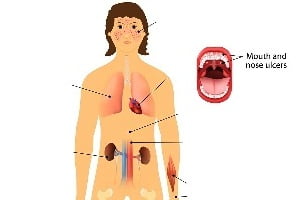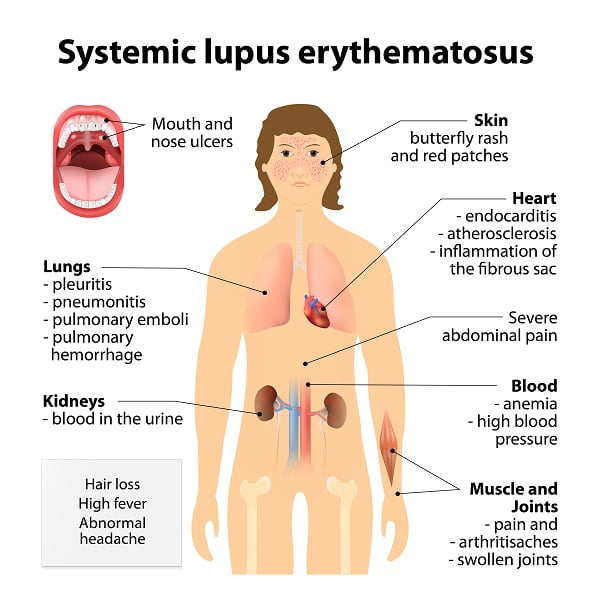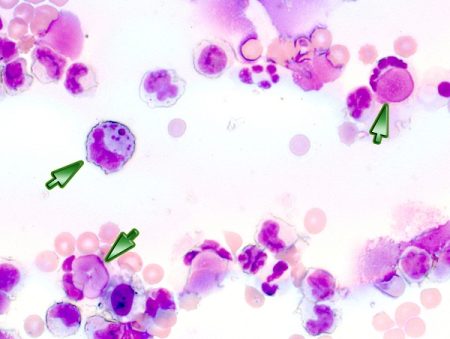Lupus Complications
- Updated on: Jul 13, 2024
- 5 min Read
- Published on Oct 3, 2019

Complications and associated conditions
A person with lupus can live a normal life. However, the severity of disease may affect the vital organ system of a person such as kidneys, lungs and hearts. Though most of the people suffering from lupus are able to continue their basic daily activities, there is a cut back in “level” of these activities. This means that the person may need a help with these activities because of joint pain, tiredness and other symptoms.

It is quite difficult to predict what would happen if it is left untreated. The severity of lupus and the probable cause helps in deciding the treatment that you should take up. A proper treatment improves the survival rate by 95%. In spite of this, the medications prescribed by the doctors have some side effects and sometimes it becomes difficult to predict which medication will respond in what way.
A constant monitoring is always required, even in cases of mild lupus. Some complications with vital internal organs like kidneys, heart and lungs are seen in people suffering from lupus.
Following are some common complications that may develop in a person suffering from lupus:
- Kidney complications
- Heart diseases
- Lung complications
- Blood-related complications
- Mental health problems
- Digestive complications
- Pregnancy complications
These complications are described in detail here:
Kidney complications
Lupus may cause serious kidney problems which may result in kidney failure. Kidney problems associated with lupus do not usually show any major symptoms. However, the person suffering may notice swelling in legs and ankles because of fluid retention.
Abnormal urinalysis (passing urine) with clumps of Red Blood cells (RBCs) is the main problem and probably a major symptom associated with lupus.
In severe cases, kidneys may stop working partially or completely. In some cases, it leads to kidney failure and sometimes death. Itching, chest pain, vomiting and edema (swelling in legs) are some general signs of kidney malfunctioning. According to a report, one in three people suffering from lupus develops serious kidney problem called lupus nephritis. Listed below are the symptoms of lupus nephritis:
- swelling in legs and ankle
- headaches and dizziness
- blood clumps in urine
- frequent urge to urinate
- hypertension
In many cases, lupus nephritis does not cause any visible symptom which in no way means that it should be ignored. A regular blood test is required in such cases.
Lupus nephritis can be controlled using immune-suppressants. In the cases of complete damage to kidneys, kidney transplant and dialysis is required for restoring of normal functioning.
Heart complications
People suffering from lupus, develop heart disease at a much younger age as compared to other people. Inflammation in the outer lining of the heart (pericarditis) is a common problem developed in lupus. Also, people with lupus have an increased risk of depositing plaque in their arteries which may lead to coronary artery disease.
Apart from thickening of arteries and heart lining, thickening of the heart valve is also reported in patients with lupus. This makes them more prone to heart failure caused due to damaged valves. Lupus is often associated with blood clots and atherosclerosis (narrowing and thickening of arteries).
With severe lupus and heart conditions, the risk of developing Coronary Heart Disease (CVD) increases to a greater extent. The person may need heart surgery to replace the damaged valves. Basically, inflammation of heart lining, damaged valves and thickened arteries lead to abnormal heart beat rhythm.
Listed below are the heart complications developed because of lupus:
- Coronary heart condition/disease
- Chest pain and angina
- Heart attack
- Heart stroke
- Irregular heart beat
Changes in life style and adherence to a proper treatment can help avoid these life-threatening situations. In order to live a normal life even with lupus, you should:
- eat a healthy and balanced diet (low saturated fat, salt and sugar)
- exercise regularly (with the proper recommendation from doctor and physician)
- stop smoking
- cut down on alcohol consumption
- maintain a healthy weight
Lung Complications
Developing inflammation around lungs is quite common in lupus. According to a survey, one out of three people suffering from lupus develops this complication with no proper symptom. Chest pain and coughing are the two major signs developed with lung inflammation. Chest pain generally worsens with a deep breath. This pain is commonly caused due to inflammation of chest muscles and ligaments. In severe cases, this inflammation reaches to joints that connect ribs to breast bone (costochondral joints).
Following are some symptoms of lung complications developed due to lupus:
- pneumonia
- chest pain during deep breathing
- angina
Some people suffering from lupus have a problem with blood clotting. Their body produces an antibody called antiphospholipid antibody which causes their blood to clot more easily as compared to other people. This increases risk of developing pulmonary emboli or a condition that causes blood to clot in lungs.
Blood-related complication
Apart from complications with vital organs in the body, people suffering from lupus may also develop some problems related to blood. However, it is not necessary that it will always cause clearly detectable symptoms. In some cases, it can be severe and life threatening. Common symptoms of blood-related complications are:
- changes in the color of blood
- anemia
- changes in organs involved with blood flow (spleen and lymph nodes)
- inflammation of blood vessels (vasculitis)
Lupus also leads to the development of antibodies that attack blood-clotting factors. This causes blood to clot to clot very easily and quickly inside the body. This leads to severe clotting complications and increased risks of bleeding or blood clotting. Anaemia due to lupus can be treated with medicines and proper consultation with the doctor.
Mental health problems
Migraine and headaches occur commonly in people associated with lupus. There are other neurological problems that are related to lupus. Some of them are listed here:
- mild loss of memory and trouble in concentrating
- errors in judgement
- stress and tension
- dizziness
- manic behaviour
- delusions
- hallucinations
- psychosis
- seizures
Seizures in lupus are caused due to blood pressure problems, infections and inflammation in blood vessels in the brain. Apart from above-mentioned complications a person suffering from lupus also feels weakness in the face, arms and legs.
Another complication related to lupus is the loss of pain sensation in the feet, hands, arms or legs. This is called as cranial or peripheral neuropathy.
If the brain is affected by lupus, the person may suffer from hallucinations and behaviour changes. He/she may also experience difficulty in remembering things and expressing thoughts.
Many people with lupus become anxious and depressed. A person suffering from lupus copes with emotional and physical stress. Thus maintaining good mental health becomes quite difficult for them. A person suffering from lupus also suffers from psychosis, a mental-behavioral disorder. In this disorder, a person becomes delusional. Sometimes, this can be caused by medications like corticosteroids and pain relievers.
Digestive system problems
Problems in the digestive system are not common in lupus. However, a person may experience difficulty in swallowing. Abdominal pain often with nausea and vomiting are common in lupus. Following are the common symptoms shown by a person when lupus affects digestive tracts:
- enlargement of the liver
- inflammation of the pancreas (pancreatitis)
- inflammation of the sac surrounding intestine (peritonitis)
- indigestion
- dry mouth
Pregnancy complications
Though lupus doesn’t affect the fertility of the person, there are certain risks associated with it if the person is pregnant. Following are the complications:
- high blood pressure during pregnancy (pre-eclampsia)
- miscarriage
- stillbirth
- premature delivery
It is best to consult the doctor if a person is thinking to have a baby and is suffering from lupus. Sometimes, babies born to women suffering from lupus are born with heart block. This is called as neonatal lupus syndrome.
Complications become stern if a person conceives during severe lupus. So, people are advised to consult the doctor during pregnancy or before conceiving.
Estrogen and prolactin are sometimes used for hormone-therapy, birth control and a part of fertility treatments. However, it is still not clear whether women suffer from flares more during pregnancy.
To decrease the risk, women are advised to avoid pregnancy during severe lupus symptoms if they have increased chances of miscarriage.
Other types of complications
Apart from above-mentioned complications, there are some other risks and complications associated with lupus. These are:
- cancer (blood and cancer of vital organs)
- infection (urinary tract infections, respiratory infections, yeast infections, salmonella, herpes)
- death of bone tissue (avascular necrosis)
Diagnosis and management of the disease at an early stage can help avoid serious problems. Read about diagnosis of lupus.












